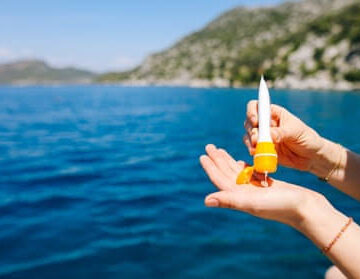Sunscreen chemicals like EHMC may be silently increasing ocean plastic pollution by strengthening harmful microbial biofilms and hindering the bacteria that would otherwise degrade plastic.
A widely used ingredient in sunscreen may be interfering with the natural breakdown of plastic waste in the ocean, according to new findings from the university of Stirling.
The compound, Ethylhexyl Methoxycinnamate (EHMC), appears to slow the decomposition process of plastic debris in marine environments.
Researchers suggest it may also encourage the growth of biofilm-forming bacteria, which are more resistant to environmental stress.
This research, led by Dr. Sabine Matallana-Surget at the University of Stirling, is the first to explore the combined effects of plastic pollution and chemical contaminants from sunscreen.
The study focuses on a phenomenon known as “co-pollution,” where plastics serve as platforms for other pollutants like ultraviolet (UV) filters.
Dr. Matallana-Surget, an Associate Professor in the Faculty of Natural Sciences, is now urging policymakers to address what she describes as the invisible threat of sunscreen.
She said, “These changes matter. By suppressing the aerobic bacteria that help degrade plastic, and selecting those that stabilize or reinforce the biofilm, UV filters would prolong the life of plastics in the ocean – making them more resistant to breakdown by sunlight or microbes.
“Targeted research and policy interventions are therefore urgently needed to mitigate these compounded ecological threats.”
How Sunscreen Chemicals Accumulate on Marine Plastics
Plastic waste in the ocean provides a new surface where microbes can grow, forming slimy layers called the plastisphere.
As well as forming the plastisphere, plastics also absorb other pollutants, including sunscreens washed off human skin that are insoluble in water, and these can then attach to marine plastic surfaces.
Sunscreens, like oil, are hydrophobic – meaning that they do not dissolve in water. This makes them a combined threat, as they can accumulate on plastics and remain in the environment.




